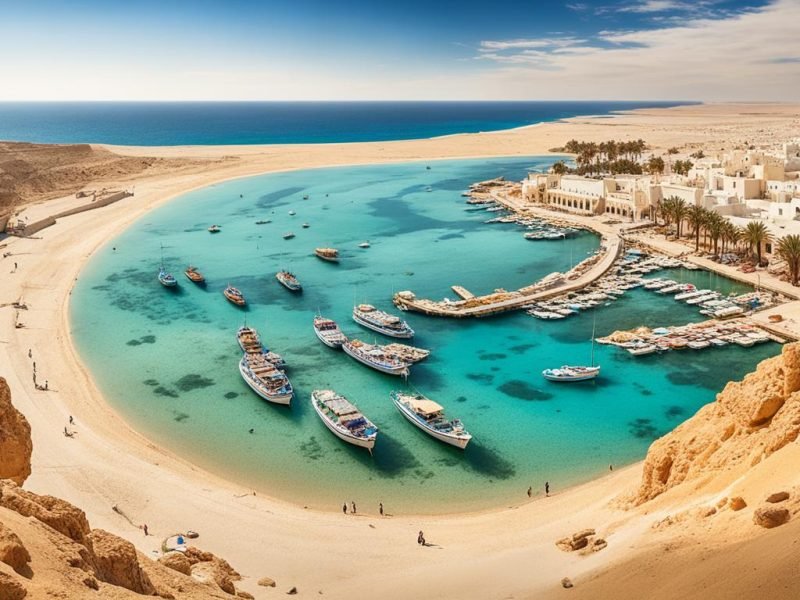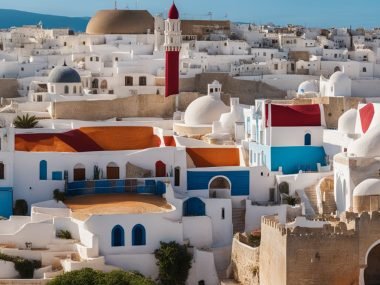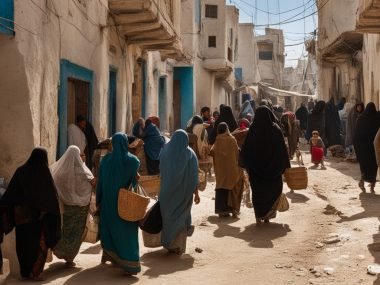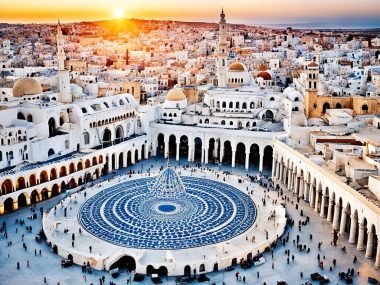Have you ever wondered about the distance between Egypt and Tunisia? They are around 2,000 kilometres apart across the blue Mediterranean. Despite this, people often ask, “Is Egypt near Tunisia?” This question shows how interested they are in their closeness. Both countries are key players in the Arab world and the Mediterranean, with a deep history and big roles today.
The link between Egypt and Tunisia is not just about space. Their stories have crossed paths through time. From ancient times and kingdoms, to being under colonial rule, they’ve grown into modern nations with strong political and economic ties. Being part of the Organisation of Islamic Cooperation and the Arab League shows how they work together in bigger Islamic and Arab circles.
Key Takeaways
- Egypt and Tunisia are separated by approximately 2,000 kilometres.
- Both countries hold significant strategic importance within the Arab world and the Mediterranean region.
- Historical connections between Egypt and Tunisia span ancient civilisations, medieval empires, and colonial periods.
- They are both members of the Organisation of Islamic Cooperation and the Arab League.
- The term “geographical proximity” encompasses cultural, historical, and political closeness as well.
Geographical Overview of North Africa
Egypt and Tunisia are key places in the North Africa geography. Knowing where they are helps us see why they’re important. They have special features because of their location.
Location of Egypt
Egypt links Africa and Asia, which is unique. It’s by the Mediterranean Sea to the north and the Red Sea east. Egypt has neighbours like Gaza, Israel, Libya, and Sudan.
Its position is at 27 00 N, 30 00 E. This shows Egypt’s big role in the area.
Location of Tunisia
Tunisia is in North Africa, by the Mediterranean Sea. It has Algeria to the west and Libya southeast. The country has mountains, plains, and touches the Sahara Desert.
Tunisia’s location is at 34 00 N, 9 00 E. Knowing how far it is from Egypt shows how close they are in Africa. When we look at North Africa geography, Tunisia is very near to Egypt. This closeness creates strong links between them.
Distance between Egypt and Tunisia
The Egypt-Tunisia distance can be looked at in many ways. These include air, land, and road travel. Knowing these distances shows how well these North African countries connect.
Measuring Distance
The land span between Egypt and Tunisia gives a clear idea of how close these countries are. This distance, whether by air or land, shows their location within North Africa.
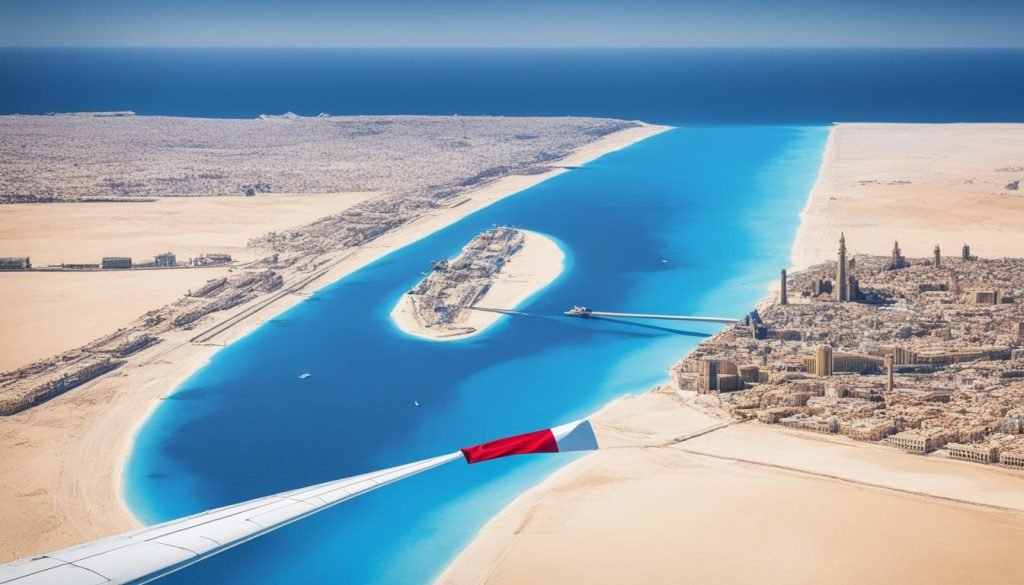
Air Travel Distance
Air travel between Egypt and Tunisia is the quickest and easiest way to get around. It connects major cities like Cairo and Tunis. On average, flying covers about 1,800 kilometres and is fast for travellers.
Road Travel Distance
Travelling by road between Egypt and Tunisia is much harder. The road routes in North Africa go through huge deserts and have no direct roads. So, road trips turn into big adventures, not easy travel. The land journey can be about 3,000 kilometres long. It includes crossing many borders and moving across big landscapes.
Is Egypt Near Tunisia?
Thinking about proximity of Egypt to Tunisia is interesting. Egypt and Tunisia are in North Africa. They share the Mediterranean coast and an Arabian heritage. This connects them culturally and historically. They hold a special place in the Arab world due to their location.
Asking “Is Egypt near Tunisia?” looks at distance and how we travel. Even though they are far apart, planes make the trip feel short. A flight from Cairo to Tunis takes just a few hours. This shows they are geographically close in today’s world.
The closeness of the countries isn’t just about distance. It’s also their cultural, historical, and political connections. Egypt and Tunisia share a long history. They have been important in the Mediterranean for many years. This shows how close they really are.
To see how proximity of Egypt to Tunisia is real, look at these points:
- They both have big coastlines on the Mediterranean. This helps with sea travel.
- Being part of the same African and Arab groups helps them work together and share culture.
- There are many flights between them, making visits easy and common.
The straight-line distance answers if Egypt is near Tunisia in simple terms. But, their deep cultural and historical connections show they are closer in a bigger way.
Historical Connections Between Egypt and Tunisia
The history between Egypt and Tunisia is really interesting. They share a deep link and unique stories.
Ancient Civilisations
Egypt is famous for its big pyramids and the mysterious Sphinx. It showed the peak of old times. Tunisia had the Carthaginian civilisation, known for its sea skills and battles with Rome. Both added much to North Africa’s rich history.
Medieval Relations
In medieval times, Egypt and Tunisia had close ties. They were both ruled by Romans and then Arabs. The Arab rule brought new laws and the Arabic language. This made their cultures and religions closer together, but sometimes there were challenges.
Colonial Period
During the colonial period, Egypt and Tunisia were controlled by Britain and France. They both faced hard times but tried to keep their own ways. This period left a mark on them through buildings, rules, and cultural bits left behind.
Modern-Day Relations Between Egypt and Tunisia
Relations between Egypt and Tunisia are friendly but sometimes tense. They’ve been shaped by major events. One key event was the Egypt-Israel peace treaty in 1973. It greatly affected their diplomatic ties.
Both countries now face shared challenges, like fighting terrorism together. This need brings them closer in keeping their region safe. Their embassies help a lot by talking and working together. They strengthen their bond by dealing with issues together.
The Arab Spring deeply changed things for both countries. Tunisia became a democracy, while Egypt saw more changes in power. Yet, their relationship keeps growing. It adapts to new political changes, highlighting their strong diplomatic links.
| Aspect | Egypt | Tunisia |
|---|---|---|
| Political Transformation | Multiple regime changes post-Arab Spring | Transition to democracy post-Arab Spring |
| Anti-Terrorism Cooperation | Active involvement | Collaborative approach |
| Diplomatic Missions | Embassy in Tunis | Embassy in Cairo |
Strategic Importance in the Mediterranean
The Mediterranean is very important for Egypt and Tunisia. Their location helps with world trade. They have big roles in global trade because of this.
Suez Canal
Egypt looks after the Suez Canal, which is very important. The canal connects the Mediterranean Sea to the Indian Ocean. It makes shipping faster, which is good for the world.
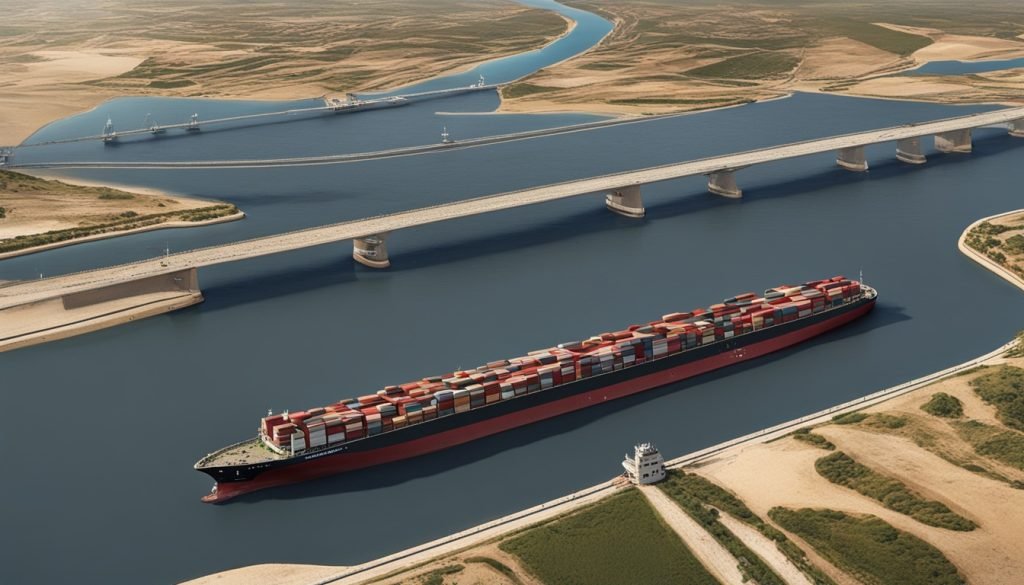
About 12% of world trade goes through the Suez Canal. This helps Egypt’s economy and North Africa’s trade. Events like the Suez Crisis and the Ever Given blockage show its importance.
Trade Routes
Old trade routes go through the Mediterranean. Egypt and Tunisia are key spots in these routes. Tunisia connects Europe, Africa, and the Middle East.
These routes have always helped move goods and ideas. Now, they’re vital for goods’ movement. This makes North Africa very important for trade.
| Aspect | Egypt | Tunisia |
|---|---|---|
| Strategic Position | Mediterranean and Red Sea | Mediterranean |
| Key Infrastructure | Suez Canal | Major Ports |
| Trade Contribution | 12% of World Trade | Key Gateway between Europe and Africa |
Egypt and Tunisia use their positions well in the Mediterranean. They help with the economy in North Africa. They are key to world trade, too.
Political Relationships Between Egypt and Tunisia
The Egypt-Tunisia political relations are built on a long history of working together. Both countries have always aimed to understand and benefit from shared interests. This happens despite sometimes not agreeing on everything.
Diplomatic Missions
North Africa feels the impact of the embassies in Cairo and Tunis a lot. These places help the two countries talk and work together well. They show Egypt and Tunisia want to keep talking and solving problems together.
Cooperative Agreements
Egypt and Tunisia have made many deals to help each other in trade and education. These deals focus on areas that help both countries grow. They come from visits, meetings, and signing important agreements.
| Aspect | Egypt | Tunisia | Common Initiatives |
|---|---|---|---|
| Economic Trade | Active in Middle East and Africa | Strategic positioning in the Mediterranean | Bilateral trade agreements |
| Educational Exchanges | Programs for students and scholars | Focus on academic and cultural exchanges | Cultural exchange programs |
| Political Cooperation | Strong engagement in Arab League | Active participation in regional diplomacy | Joint regional initiatives |
These efforts show the strong teamwork between Egypt and Tunisia. Even when it’s tough, they keep working together. Their work in North Africa shows how committed they are to a stable and prosperous future.
Economic Ties between Egypt and Tunisia
Egypt and Tunisia have been growing closer economically in the last few years. They’ve been trading more and finding new ways to invest in each other. They know working together is good for their money growth. By making deals to help each other, they are becoming important in their area.
Trade Relations
They trade more now than ever before. There are new deals that make trading easier and help both countries. This helps both places use what the other has to offer. It’s good for their whole economy.
Investment Opportunities
There are lots of chances to invest in both countries, in many areas like making things, visiting places, and new tech. They’re making it easier to invest and giving perks to do so. This brings in money and jobs, and helps everyone in the long run.

